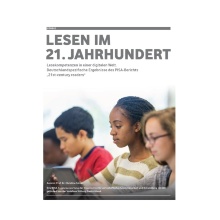In late 2019, the 2018 PISA study was published, which focused for the third time on reading ability, after 2000 and 2009. The study also included, in particular, aspects of reading in the digital age. Prof. Christine Sälzer, who is a professor of education at the University of Stuttgart, has now analyzed the PISA report “21st-century readers” for the OECD in more detail, with regard to the data that are specific to Germany. This concerns the topics of learning opportunities, learning strategies, reading in a digital world, gender-specific and socio-economic disparities in reading ability, and recommendations for education policy.
What becomes clear is the central role of reading strategies as the key to success. They are an essential prerequisite for reading ability, i.e. the ability to comprehend, memorize, and summarize a piece of text as well as to assess its credibility. On the other hand, the report’s findings show that the joy of reading has significantly decreased among school students in the past years. Reading well and being able to make sense of a text is not learned automatically, says the expert. Reading ability must be acquired and practiced continuously through training. Precisely the search for and cross-linking of different sources is a modern skill that must be acquired in a targeted manner. Teachers of all subjects play an important role in this context. Because relevant information needs to be separated from non-relevant information also in math problems, for example.
Another focus of the study is on the use of digital media for school purposes, i.e. in class and also for homework and exam preparation. The current pandemic-related digitalization push in the education sector thus gives the evaluation a very special topicality. Christine Sälzer warns: “Using digital media for school purposes is not a sure-fire success. This has recently been shown in studies related to a variety of school subjects.” Sälzer: “Digital media in class are a good choice when pedagogy and didactics, that is the understanding of teaching and learning, go with it and when these media are used as a tool to meet the learning objective.” If students were left alone with an assignment, they would be at risk of getting bogged down in the details. The PISA study even shows a negative correlation between reading ability and how often digital devices are used for school purposes.
Christine Sälzer believes that the impact of intensive home schooling on reading ability is still largely undetermined: In Germany, there is a lack of systematic data collection on learning progress, but also on the well-being and the motivation of students and their teachers. First regional studies present a very heterogeneous picture, showing concerns about children and teenagers who have fallen behind on the one hand, and schools that surpassed themselves during the pandemic on the other hand. It is important to pursue long-term strategies because of the pandemic in order to gradually return to normal mode and critically revise the curricula in the process.
Further information on the special evaluation of the PISA study can be found under: Reading in the 21st century (results for Germany) - Vodafone Foundation Germany (vodafone-stiftung.de)
PISA (Program for International Student Assessment)
The OECD’s PISA studies have been conducted on a triennial basis in most OECD member states and in partner countries since 2000. The PISA study assesses the knowledge and skills of fifteen-year-olds that are relevant to everyday life and the workplace. Data are still being collected for the next study, whose findings will be published in late 2022, instead of 2021, due to the pandemic.


